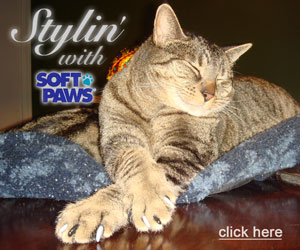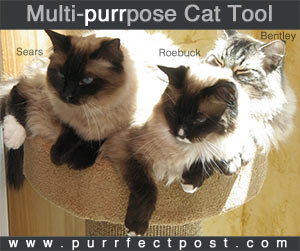Why Do Cats Purr?

Sitting with a purring kitty on your lap could be one of the most relaxing things you can do. A soft, warm bundle that's making a low rumbling noise can be soothing and inspire feelings of love and well-being in the humans nearby. Is that why cats purr, though? To make their humans feel happy?
How and Why Do Cats Purr?
Cats begin purring when they are a few days old. It is something that seems to happen in cats' vocal chords, but we don't actually know exactly how a purr is created. It's amazing to think about, but cats can make a purring sound both while they are inhaling and while they are exhaling.
Like a human's voice, a cat's purr is distinctive to the individual. If you have many cats, you can probably identify the different purr of each one.
Big cats that don't roar, like mountain lions, can purr, but those that roar, like lions, do not.
While most of what we know about purring is speculative, it seems as though they purr for some of the following reasons:
- When they are scared, like at a veterinary visit.
- When they are in pain, possibly to self-soothe but maybe to elicit soothing from others.
- When they are having kittens.
- Kittens purr while nursing and mama cats purr while nursing them, presumably out of contentment.
- When meeting new cats, possibly as a sign of non-aggression.
Cats seem to learn how to use their purrs to get what they want from their humans. They might purr differently or more loudly in certain situations of for various people if they've learned that those purrs elicit a favorable response, like more petting or the delivery of a treat.
In fact, research indicates that there is a sound that mimics crying within a cat's purr, and that sound triggers a caring reaction in humans. Cats seem to be able to recognize this and manipulate that sound to increase a person's response (Karen McComb, 2009).
Purring Might Be Healing
Recent research is exploring the healing properties of purring. The frequency of a cat's purr is the same as that which has been shown to help muscles and bones heal faster. In other words, a purring cat might help a broken bone mend better and more quickly.
In fact, scientists have been wondering if that might be why cats seem to suffer from fewer bone and joint problems than dogs do. It could even be the basis for why veterinarians often say that if you put a cat in the same room as a broken bone, the bone will heal.
Having a cat can help reduce a person's chances of dying from a heart attack (Adnan I Qureshi, 2009), and it's easy to believe that the soothing nature of a cat's purrs could have something to do with that.
Some Cats Drool When They Purr
Drooling can indicate a medical problem in cats, like dental disease, a mouth tumor, or nausea. But some cats drool when they are super relaxed and purring. This seems to be an individual characteristic, and you should bring it up to your veterinarian if your cat does it. In general, though, if the drooling only occurs while you are petting your cat and/or she is in a highly relaxed state and there are no other signs of illness, it could simply mean she's happy.
Purring Is Often Accompanied by Kneading
Cats sometimes knead their front paws, rhythmically contracting one and then the other, when they are feeling relaxed, and purring often occurs simultaneously with kneading. If your cat kneads (and drools) when content and happy, you can protect your lap from claw pricks and saliva by using a soft blanket between you and your kitty.
Works Cited
- Adnan I Qureshi, M. M. (2009, Jan. 2). Cat ownership and the Risk of Fatal Cardiovascular Diseases. Results from the Second National Health and Nutrition Examination Study Mortality Follow-up Study. Retrieved from ncbi.nlm.nih.gov.
- Karen McComb, A. M. (2009, July 14). The cry embedded within the purr. Retrieved from cell.com: DOI: 10.1016/j.cub.2009.05.033.





